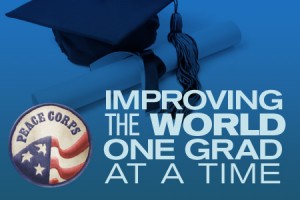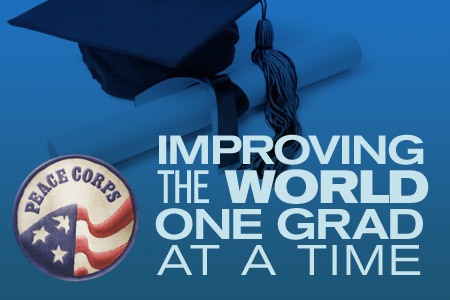Joining the Peace Corps

While on my search for what I’m supposed to do with my life (you know, the one they tell you about in freshman seminar, where you are supposed to find that elusive calling), my academic adviser pointed out to me that I didn’t have to jump straight into a job after my four years here at Maryville College are done. There were other options that she thought I could and should explore.
One of these just so happened to be joining the Peace Corps.
The Peace Corps was founded in 1961 after President John F. Kennedy (then a senator) challenged a group of students at the University of Michigan to serve their country as humanitarians in developing countries. The Corps sends its members to 78 different countries, where the volunteers stay for 27 months.
I had mentioned once before that I was thinking about joining, but was it really something I wanted to do? I love helping people, but this is a big decision. (You know, one of those “real-life” types that makes you think really hard before deciding.)
So, at my adviser’s behest, I decided that I would go speak with MC alum and current professor Scott Steele, who has experience with the Peace Corps, having both served two years in Papua New Guinea and worked at the organization’s office doing placement.
After looking at the Peace Corps’ website, I thought that the application process would be the longest part, but Steele said that it took a total of 16 months for him to get placed. The first placement he had was in French Polynesia, but that fell through.
He said that the hardest part of the process before getting placed is patience. Many people don’t get placed because, by the time placement comes, they have either forgotten or no longer want to participate.
Steele said that he too had nearly forgotten that he had applied, but, after speaking with his former college adviser (Steele had graduated from MC at this point), he decided that he should go while he was still young.
There were two particular memories that stuck with him the most while he was working at a boarding school there.
“We had a little boy …” Steele said. “He got tuberculosis, and his family could not come and get him … so they isolated him [at the school]. There … he was really shunned because he had tuberculosis … His brother was also shunned.”
The young boy’s brother risked being shunned or quarantined at the boarding school in order to be with his younger brother.
The other memory Steele recounted occurred during his first weekend of deployment.
“Kids had to clean the school, and we had activities for them from 6 in the morning to 8 or 9 at night,” Steele said. “[The] very first morning [when students were bathing in the river] a little boy [was] attacked by a crocodile.”
In response to these two difficult, memories Steele said that “[the people of Papua New Guinea] looked at life differently.”
“[It was] a very harsh life,” he continued. “The average age of adults [at the time of death] was 44.”
“The first 10 days on my site …those were hard days,” he said.
With memories like the above, I can see why.
However, he argued that coming back was even harder. He said that he walked into a store and that he became confused with how many different types of cheeses there were. In New Guinea, he said that if someone had cheese to sell, you didn’t question it; you just bought it.
Still, he recommends joining the Peace Corps to MC students, at least as something to think about.
“It was really hard, but I think that it helped me figure out how to overcome obstacles,” Steele said. “I think [MC does] a really great job of getting people ready to move on from here … and Peace Corps took that to a different level for me.”
As I stood to go back to my normal routine, Steele offered me a few choice words of wisdom to contemplate. In fact, it was a near echo of Dr. Henson’s lecture in the Community Conversations series. Henson explained said that we in America tend to think that due to our status and development we have really complex lives and that people in less developed countries have simpler lives. He told me that this isn’t the case and that sometimes he questioned whether they were helping or harming the community that they were working in.

